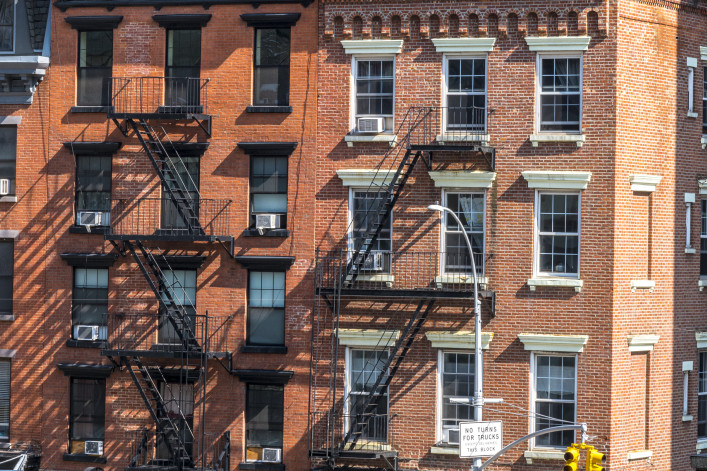I tried NYC’s revamped housing information site. Here’s how you can use it to hunt for rentals, or check complaints about your landlord
- HPD Online provides data on complaints, violations, and bed bugs for thousands of apartments
- Roughly 2.3 million people have logged onto the new website since its soft launch in May

HPD Online has several useful features for renters researching a new apartment or wanting to know more about their current residence.
iStock
This month, New York City relaunched its website HPD Online, which presents data on hundreds of NYC buildings, and it’s an apartment-sleuth’s dream come true.
HPD Online lets users track complaints about their apartment, view past lawsuits involving their building, monitor unsafe conditions and check out a building’s bed bug history. The website contains similar information to its predecessor, but the newly-improved version is easier to use and more accessible for residents with disabilities, according to NYC’s Department of Housing Preservation and Development.
“The redesigned HPD Online acts as a bridge, breaking down the barriers between New Yorkers, their local government, and building owners, offering an intuitive and user-friendly portal that places vital government information right at your fingertips,” HPD Commissioner Adolfo Carrión said in a statement.
[Editor's note: This article was originally published in November 2023. We are presenting it again as part of our winter Best of Brick week.]
As a journalist, I’m intimately familiar with the handful of websites that let New Yorkers research their apartments and landlords. Many can be difficult to navigate without practice, but HPD Online offers a simple, intuitive interface that provides a great starting point for further research. It’s also impressed local renters.
“The site seems easy to navigate,” says a tenant living in Crown Heights, Brooklyn, who requested anonymity because she’s currently using the site to monitor her complaints against her landlord. “It was really simple to look up my building, and I feel like the information is laid out in a way that is easy to understand.”
HPD quietly launched its redesigned site in May, garnering 2.3 million unique users in the past six months, according to the agency.
If you want to use HPD Online to research an apartment or keep tabs on a building complaint, read on for some advice.
How to use HPD Online
HPD Online has several useful features for renters researching a new apartment or wanting to know more about their current residence. But the first section I dove into was my apartment’s bed bug reports, because what New Yorker isn’t terrified of those minuscule monsters?
Property owners are required to file an annual report detailing whether any of their units had bed bugs, and HPD Online summarizes the results of past reports on its site. (Thankfully, all my previous NYC apartments were free and clear). HPD Online is a great source to check out bedbug reports, which you won’t find on other sites such as the NYC Department of Buildings.
HPD Online’s complaints and violations tabs are a great resource for renters looking to get a sense of whether a building is safe, and for residents experiencing a problem with their apartment. For example, a tenant whose apartment doesn’t have hot water can use the complaint section to see if other residents have reported the same issue.
Meanwhile, the violations section lists situations where the landlord hasn’t lived up to their obligations under the Housing Maintenance Code, such as failing to keep a building’s fire escapes clear. You can expand individual violations to see more details, though you may need to use HPD’s data dictionary to interpret some of its shorthand.
What other sites to check
HPD Online also lists any past housing court cases against your landlord or another tenant, but only lists the type of case, when it was opened, if it’s still ongoing, and if there was a judgment that wasn’t paid. If you want additional information about a past court case, you should head to your borough’s housing court to view the case documents yourself.
It’s also worth checking two Department of Building’s websites: DOB Now and the DOB Building Information Search. HPD Online will show housing code violations, but it will not display violations of the city’s building’s code, which fall under DOB’s purview.
You can use HPD Online to find the name of the business that owns your building—often an anonymous limited liability company. But HPD Online also lists the entity’s managing agent, officer, and head officer, who could either be your landlord or your first step in finding them.
If you want to do additional research on your building’s owner, you should check out JustFix, a housing nonprofit that collects data on NYC landlords and helps renters request repairs on their apartment.
JustFix can also help you request your rent history, which will tell you if your apartment is or previously was rent-stabilized. HPD Online should list if any of the building’s units are rent regulated on a property’s profile page, but I found at least one case where it did not list a rent-stabilized building as rent regulated. If you search for a new affordable housing development, HPD Online won’t display a property profile until the property registers with the agency.
Always make sure to request your rent history yourself if you suspect your apartment should be regulated, or if you’re just curious about your building’s history. You can get your rent history through JustFix, by emailing a REC-1 form to the Division of Housing and Community Renewal, or by mailing it to their office at 92-31 Union Hall St., 6th floor Jamaica, NY 11433.




























